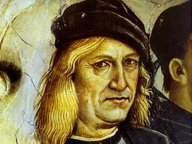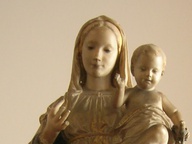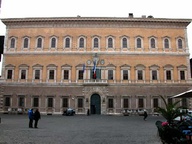Sophie Calle. MAdRE
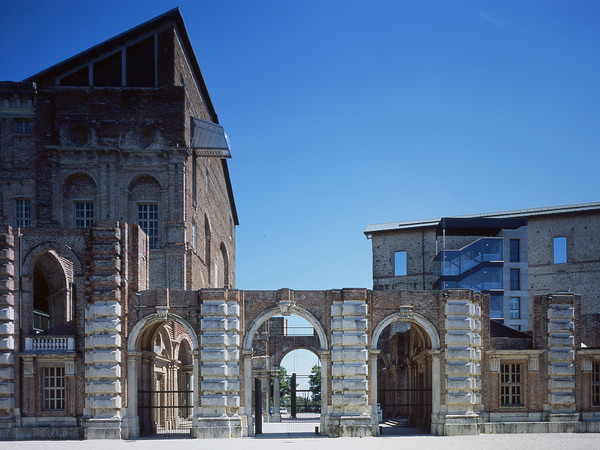
© Castello di Rivoli – Museo d'Arte Contemporanea / Ph Paolo Pellion, Torino | Il Castello di Rivoli, l’atrio juvarriano e la Manica Lunga
From 11 Ottobre 2014 to 15 Marzo 2015
Rivoli | Turin
Place: Castello di Rivoli
Address: piazza Mafalda di Savoia
Times: Tuesday to Friday 10 am - 5 pm; Saturday and Sunday 10 am - 7 pm
Responsibles: Beatrice Merz
Ticket price: full € 6.50, reduced € 4.50, free under 11 yrs. and disabled people
Telefono per informazioni: +39 011 9565222
E-Mail info: info@castellodirivoli.org
Official site: http://www.castellodirivoli.org
A major new exhibition project marks the march toward the Castello di Rivoli to the finish line of his first thirty years of activity. Once again an international exhibition which sees, as is the tradition of the museum, something beyond mere collaboration with a prestigious artist but rather, a challenge, a confrontation on the part of the artist himself with a place full of history, from correlate with their own stories and narratives, with experienced staff become an object of art and research. This is the case of the great shows that the Castle dedicating the famous French artist Sophie Calle, the unquestioned leader of the world art scene, which offers a fully site-specific project for the stately rooms on the second floor of the Savoy Residence. The concept of the exhibition is on the development of two important projects that the artist has put in place several years: Rachel, Monique and Voir La Mer. The comparison between these major projects offers two distinct paths together and together, including works by focusing on the themes of affection and emotion, on death, on the analogy mother | beach at the base of the title of the exhibition: a sea that welcomes and unites, covers and invests immensity of feelings and mixed emotions.
The artist has always worked around issues such as separation from a loved one, the breakup loving, intimate life in general managed to make it effectively in addition to the emotions as well as the philosophical side, the reflection that they evoke, accompanying the development culture through staff through an organization so precise as to be almost obsessively made ??objects, video and text: sort of mise-en-place and organization of theatrical spectacle without drama. A process of appropriation for images where even the visitor, if he considers that he lost, can find a route and do it at the end just like in a novel role.
Since the late seventies Calle works with methods very provocative and controversial, putting in close relation with the phases of their emotions and the events of his personal life. The exhibition at the Castello di Rivoli reveals the side of "buncher images" of the artist along with his ability to make the same at all essential to the limit of minimal; we would say pure emotion.
The emotional aspect of the artist does not, however, obscure the analytical section; questions about what it means not to see, what is not seeing. In other words, a philosophical reflection on what it is that we do not see, on the role played by the bonds and memories, on the paradox of nature that welcomes, which creates and destroys, the blindness that creates unconsciousness and the absence of vision by certain aspects of the final detachment. There is an epic work of Sophie Calle who identifies himself well in addressing the issue of the daily tragedy by making shared their personal pain, along with a liberating effect and mnemonic.
Rachel, Monique
is a schedule of works that sees the light from the video shoot in the death of the artist's mother. From the Venice Biennale in 2007, where he was exposed only video, the work has evolved steadily over time accumulating elements and memories almost in diary form backwards, increasing the corpus of works by the artist that will be exhibited in historical and widely decorated the castle embroidering a new kind of dialogue between the memories of a historic place and objects dear to the mother or rather objects and words that draw lifeblood from memory and are transformed into objects of art. Calle same precise object of its analysis by stating, "My mother loved to be the subject of discussion. His life did not appear in my work and this displeased. When I placed my camera at the foot of his bed of death - I wanted to be there to hear his last words, and I was afraid that she might die in my absence - said: 'At last'. "
Voir la mer
Video installation specially conceived for the room 18, which has seen over the years some of the most significant site-specific projects for the Castello di Rivoli. Still, the artist introduces well the project "In Istanbul, a city surrounded by the sea, I met people who had never seen. I took them on the Black Sea coast. They came to the water's edge, separately, downcast eyes, closed, or masked. I was behind them. I asked them to look out to sea and then come back to me to let me see those eyes that had just seen the sea for the first time. "Calle capture feelings, happiness and dismay through the moment in which the protagonists are turning after several minutes spent to "contemplate" something never seen before. Never seen for the double obstacle of disability that does not allow them to see with the eyes and the social condition that has denied them up to that point of being able to dip - they were born and lived in a seaside town - in the perception of the sea, in a different viewing modes. In a city surrounded by sea in the middle of the twenty-first century, the artist finds and invites people, who have never gone beyond the physical limit, to get out of it to bring back the wonder of the unseen. An old man, a child and a woman with a baby in swaddling clothes, greet visitors in the room, with astonished faces who do not see but they speak in a direct and frontal.
The artist has always worked around issues such as separation from a loved one, the breakup loving, intimate life in general managed to make it effectively in addition to the emotions as well as the philosophical side, the reflection that they evoke, accompanying the development culture through staff through an organization so precise as to be almost obsessively made ??objects, video and text: sort of mise-en-place and organization of theatrical spectacle without drama. A process of appropriation for images where even the visitor, if he considers that he lost, can find a route and do it at the end just like in a novel role.
Since the late seventies Calle works with methods very provocative and controversial, putting in close relation with the phases of their emotions and the events of his personal life. The exhibition at the Castello di Rivoli reveals the side of "buncher images" of the artist along with his ability to make the same at all essential to the limit of minimal; we would say pure emotion.
The emotional aspect of the artist does not, however, obscure the analytical section; questions about what it means not to see, what is not seeing. In other words, a philosophical reflection on what it is that we do not see, on the role played by the bonds and memories, on the paradox of nature that welcomes, which creates and destroys, the blindness that creates unconsciousness and the absence of vision by certain aspects of the final detachment. There is an epic work of Sophie Calle who identifies himself well in addressing the issue of the daily tragedy by making shared their personal pain, along with a liberating effect and mnemonic.
Rachel, Monique
is a schedule of works that sees the light from the video shoot in the death of the artist's mother. From the Venice Biennale in 2007, where he was exposed only video, the work has evolved steadily over time accumulating elements and memories almost in diary form backwards, increasing the corpus of works by the artist that will be exhibited in historical and widely decorated the castle embroidering a new kind of dialogue between the memories of a historic place and objects dear to the mother or rather objects and words that draw lifeblood from memory and are transformed into objects of art. Calle same precise object of its analysis by stating, "My mother loved to be the subject of discussion. His life did not appear in my work and this displeased. When I placed my camera at the foot of his bed of death - I wanted to be there to hear his last words, and I was afraid that she might die in my absence - said: 'At last'. "
Voir la mer
Video installation specially conceived for the room 18, which has seen over the years some of the most significant site-specific projects for the Castello di Rivoli. Still, the artist introduces well the project "In Istanbul, a city surrounded by the sea, I met people who had never seen. I took them on the Black Sea coast. They came to the water's edge, separately, downcast eyes, closed, or masked. I was behind them. I asked them to look out to sea and then come back to me to let me see those eyes that had just seen the sea for the first time. "Calle capture feelings, happiness and dismay through the moment in which the protagonists are turning after several minutes spent to "contemplate" something never seen before. Never seen for the double obstacle of disability that does not allow them to see with the eyes and the social condition that has denied them up to that point of being able to dip - they were born and lived in a seaside town - in the perception of the sea, in a different viewing modes. In a city surrounded by sea in the middle of the twenty-first century, the artist finds and invites people, who have never gone beyond the physical limit, to get out of it to bring back the wonder of the unseen. An old man, a child and a woman with a baby in swaddling clothes, greet visitors in the room, with astonished faces who do not see but they speak in a direct and frontal.
SCARICA IL COMUNICATO IN PDF
COMMENTI

-
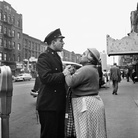 Dal 25 aprile 2025 al 28 settembre 2025
Padova | Centro Alinate San Gaetano
Dal 25 aprile 2025 al 28 settembre 2025
Padova | Centro Alinate San Gaetano
-
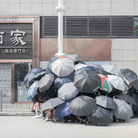 Dal 24 aprile 2025 al 08 giugno 2025
Reggio nell'Emilia | Sedi varie
Dal 24 aprile 2025 al 08 giugno 2025
Reggio nell'Emilia | Sedi varie
-
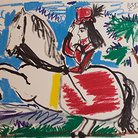 Dal 19 aprile 2025 al 12 ottobre 2025
Jesolo | JMuseo
Dal 19 aprile 2025 al 12 ottobre 2025
Jesolo | JMuseo
-
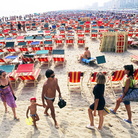 Dal 19 aprile 2025 al 05 ottobre 2025
Riccione | Villa Mussolini
Dal 19 aprile 2025 al 05 ottobre 2025
Riccione | Villa Mussolini
-
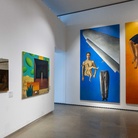 Dal 17 aprile 2025 al 14 settembre 2025
Roma | Museo Carlo Bilotti Aranciera di Villa Borghese
Dal 17 aprile 2025 al 14 settembre 2025
Roma | Museo Carlo Bilotti Aranciera di Villa Borghese
-
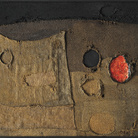 Dal 17 aprile 2025 al 06 luglio 2025
Perugia | Palazzo della Penna - Centro per le Arti Contemporanee
Dal 17 aprile 2025 al 06 luglio 2025
Perugia | Palazzo della Penna - Centro per le Arti Contemporanee
